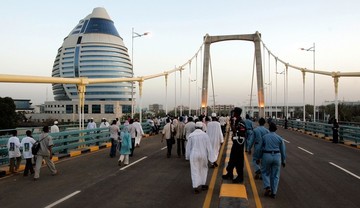Sudan officially launches second round of subsidy cuts amid tightened security
September 22, 2013 (KHARTOUM) – The streets of Khartoum on Sunday witnessed heightened security presence as gas stations updated their fuel prices to reflect today’s directives issued by the oil ministry by which all grades of gasoline saw a price increase.

Security officers have also rounded up several opposition youth figures which included Sideeg Youssef (Sudan Communist Party); Mohamed Abdel-Moniem and Munzir Abul-Meaali (Arab Nasserite Unionist Party); Mohamed Hassan Boushi (Baath Party); Omer Dafalla (National Umma Party).
Furthermore, vehicles belonging to the National Intelligence and Security Services (NISS) were reportedly seen near the residence of National Consensus Forces (NCF) chairman Farouk Abu Essa while social media sites claimed that security agents stormed the home of Baath party leading figure Mohamed Diaa al-Deen.
Last year certain subsidies on food and fuel were partially lifted drawing rare but small anti-government demonstrations.
In Khartoum, the Sudanese president Omer Hassan al-Bashir held a two-hour press conference which he devoted primarily to defending the move to cut subsidies and reiterated his earlier arguments that most of these subsidies goes into the pockets of the wealthy population at the expense of the poor ones.
Bashir further asserted that some neighboring countries benefit from the subsidies as a result of smuggling adding that it is hard to control the borders to prevent that due to its length. He further said that some government officers allow the smuggling in return for bribes.
The Sudanese leader emphasized that the decision was made collectively by the government and rejected criticism directed at the Finance and National Economy Minister Ali Mahmood Abdel-Rasool on the assumption that he is behind this economic package.
He dismissed fears that this move will lead to an ‘Arab Spring’ in Sudan and noted that some people rushed to the market to buy goods and stock it at home fearing a big price increase.
But Bashir said that this is only temporary and that those who stocked goods at their home would seek to get rid of it later “at a loss”.
He went on to say that inflation rate has declined from 43% two months ago to 23% currently and that after removing fuel subsidies the economy will stabilize which will help devote resources to agriculture and industry as well as curbing speculative activities in land and currencies.
On Sunday the Sudanese pound further slid against the US dollar in the black market to 8.2 pounds from 7.8 which substantially different from the official rate of 4.4.
Some of the black market traders attributed the decline to a strong demand on the US dollar by individuals and foreign organizations operating in the country. They also pointed out that economic measures planned by the government and the decision of Central Bank to open the door for importing luxury goods also contributed to the increase in the dollar exchange rate.
The Sudanese president rebuffed demands for further cuts in government structure saying that even if the entire cabinet and their ministries were abolished, it will only generate savings of 2% only.
NO NORMALIZATION WITH ISRAEL
Bashir also vowed not to normalize relations with Israel regardless of the price. He noted that his government was told early on that the improvement of relations with Arab countries depends on good relations with the US which in turn requires establishing ties with the Jewish state.
“Livelihood is in God’s hands, Bashir stressed “and not in the hands of the US or Israel”.
He gave an example of gold production which came at a surprise to the government particularly after the secession of the oil-rich south in July 2011 which brought a new source of revenue and hard currency.
AGREEMENT WITH UMMA PARTY ‘IMMINENT’
Bashir said that the ruling National Congress Party (NCP) he chairs is open to dialogue with all other political powers on the drafting of the new constitution and the associated mechanisms on writing it and approving it later.
“We have no objections to developing national principles that are agreed to by all Sudanese,” Bashir said.
He acknowledged that the NCP sought to bring people from all other parties under his party’s umbrella but failed saying that differences are between the leaders only but not on principles.
The Sudanese leader also disclosed that they have reached an agreement with the opposition National Umma Party (NUP) that will soon be signed.
But Mariam al-Mahdi, a leading NUP figure, sent a broadcast text message to journalists denying any such accord.
Bashir also spoke of “promising talks” with the Popular Congress Party (PCP) which came to life as a result of the fallout between Bashir and the Islamist figure Hassan al-Turabi.
(ST)
